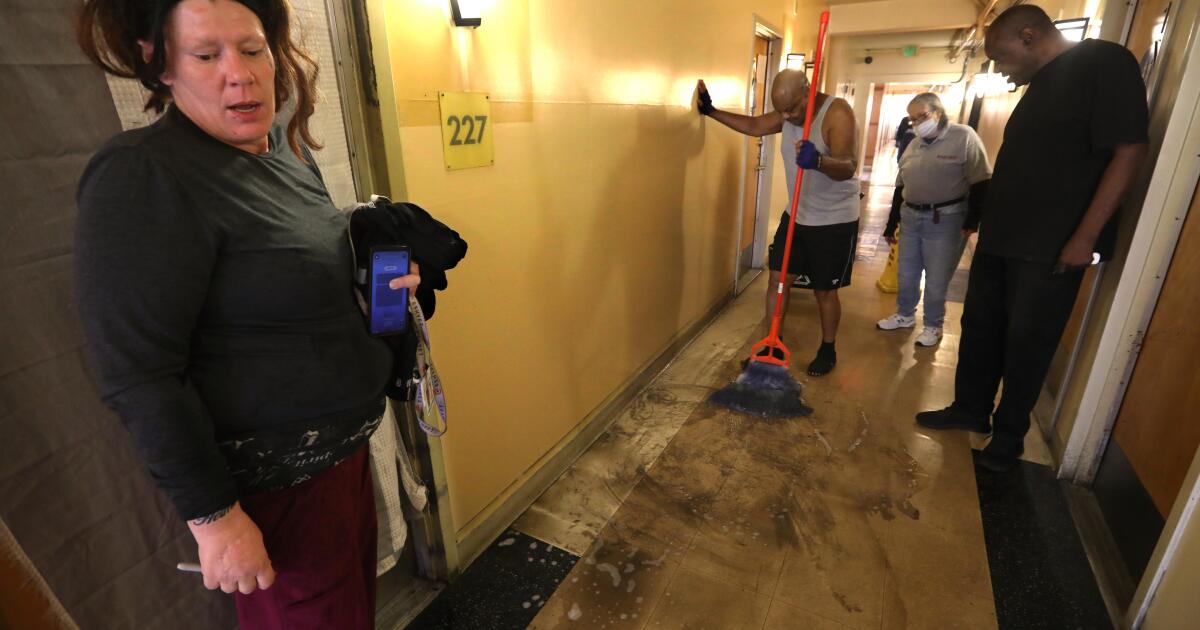Skid Row Tenants Decry Deterioration in Living Conditions Since New Landlord Took Over
As days went by and dirt, dog waste and grime piled up in the Produce Hotel in Skid Row, Jermaine Staley broke into the janitorial closet. The 78-year-old tenant spent four hours over an afternoon last week sweeping staircases and common areas and he was finishing by mopping the lobby. Sweat glistened on his head and pooled on his undershirt.
Janitorial Services Cut Back
“They ain’t got no soap,” said Staley, who has lived in the building for 27 years. “I had to use my own soap.”
Conditions Deteriorate After New Landlord Takes Over
Tenants in multiple buildings said their incoming landlord’s changes have led to filthy shared bathrooms, constant trespassers and growing fears of violence. Fuschia Hayes, a resident of the Senator Hotel since 2020, said the reduced security has allowed drug dealers to cycle in and out and squatters to fill empty rooms.
Residents’ Concerns
“The building’s just nastier now,” said Hayes, 30.
City Leaders’ Efforts to Provide Long-Term Stability
The rapid diminishment in quality of life described by residents represents another setback in city leaders’ attempts to provide long-term stability to one of the region’s largest portfolios of homeless housing.
Background on the Trust’s Sale
Eighteen months ago, with nonprofit owner Skid Row Housing Trust on the verge of collapse, Mayor Karen Bass and other city leaders pushed the buildings into receivership. The sale of 17 former trust properties to Pustilnikov this fall was supposed to end the saga.
City’s Concerns
Bass said she was “absolutely” concerned about service cuts in the buildings.
New Landlord’s Response
“We want to make sure that in all of the housing people are safe, they’re cared for, they’re getting the services that they need,” Bass said at a news conference in Skid Row last week.
New Landlord’s Plan
Pustilnikov said the level of third-party security and maintenance services he inherited at the buildings — 24/7 armed security with two guards on duty overnight and daily janitorial shifts at many buildings — was financially unsustainable, costing more by itself than buildings’ annual rent revenues. Security coverage, he said, now consists of night shifts during the week and additional shifts on the weekend.
Future Plans
Pustilnikov said he’s planning to spend millions to install cameras and expand trash rooms to more efficiently handle the issues.
Residents’ Reactions
Many tenants in the buildings are elderly, disabled, mentally ill or addicted to drugs. The makeup of the residents is a result of the region’s system for prioritizing the most vulnerable and troubled people for permanent housing. Pustilnikov said his top priority is ensuring tenants receive the social services they’re entitled to, which he said will do more to improve conditions than anything else.
Conclusion
As the situation continues to deteriorate, residents are left wondering what the future holds for their living conditions. Will the new landlord be able to turn things around, or will the situation continue to worsen? Only time will tell.
FAQs
Q: What is the current state of the buildings?
A: The buildings are in a state of disarray, with trash piling up, floors covered in dust, and a growing roach problem.
Q: What is the new landlord’s plan to address the issues?
A: Pustilnikov plans to spend millions to install cameras and expand trash rooms to more efficiently handle the issues.
Q: What is the city’s response to the situation?
A: The city is closely monitoring the situation and will take immediate action if conditions are found to be substandard.
Q: What is being done to address the social services needs of the residents?
A: Pustilnikov has identified this as a top priority, stating that providing social services will do more to improve conditions than anything else.


